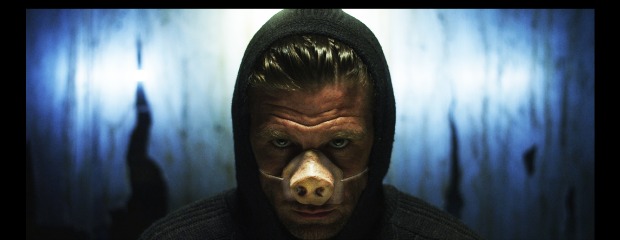Piggy
The incessant instrumentation only serves to amplify the unnecessary melodrama that is central to Piggy‘s problems.
Plot summary
Joe is a mild mannered young man bored by his humdrum London life. When his beloved brother is murdered, Joe finds solace in Piggy, one of his brother's old friends. Piggy helps Joe to cope with grief, intent on saving him and helping him get justice for his brother's killing.

Bleak realism, tough lives and urban gloom. Piggy, the debut feature from young writer-director Kieron Hawkes, is the kind of film for which critics play a game of chicken over who first uses the words “gritty British drama” (a hollow victory right there for others , if claimed). There’s violence, too, of course. At one point, the film’s title character stamps on a man’s head perhaps as many as 30 times; each and every blow causing such a crushing squelch that it wouldn’t be surprising to see the camera tilt down to a pile of pulverised watermelons.
Martin Compston (of The Disappearance of Alice Creed fame, among other things) plays Joe, an extremely shy, anxious Londoner whose only company is a sleepless night’s spliff. Delivering parcels on foot by day as a courier to cover the bills, he crosses the street at night to avoid anyone vaguely suspect. When his protective older brother John (Neil Maskell) re-enters his life, however, Joe’s isolation is briefly lifted as he begins to come out of his shell and, occasionally, his dingy flat. But after John is violently attacked following an altercation at the pub, Joe struggles to balance his fear of confrontation with an angry desire for revenge, which is further stirred up by a strange new acquaintance named Piggy (Paul Anderson).
Anderson is impressively wiry and intimidating as the violent Piggy, who takes advantage of a young man’s tender emotions. Compston counters this convincingly for the first hour with his shy, vulnerable Joe, who slowly draws further into himself with dire consequences. But Compston is let down by the questionable need for Joe’s emotional narration throughout, which at times strays into sixth-form drama monologue territory. It’s frustrating, as Compston’s acting is clearly good enough to convey a sense of Joe’s feelings without the need for him to constantly drone on that he feels “angry, isolated…” etc, etc. I waited for Joe to break the gloom with “…but then I visited Go Compare.com and got a quote within minutes!” simply to justify the melodrama, but it wasn’t to be.
Notably, Bill Ryder-Jones – former guitarist with Liverpudlian band The Coral – composed the soundtrack, which is layered on as thick as cheese over the top of Joe’s tiring narration. Used in moderation, the sad, eerie sounds could have been more appropriate, but the incessant instrumentation only serves to amplify the unnecessary, aforementioned melodrama that is central to Piggy‘s problems.
A better film could have been made from some interesting ideas here, which aren’t fully explored or realised. Nevertheless, whenever the film overdoes it, there is also a bed of solid cinematography and performances to promote green shoots of recovery – enough to suggest Kieron Hawkes may yet have a bright future as a film maker.











COMMENTS